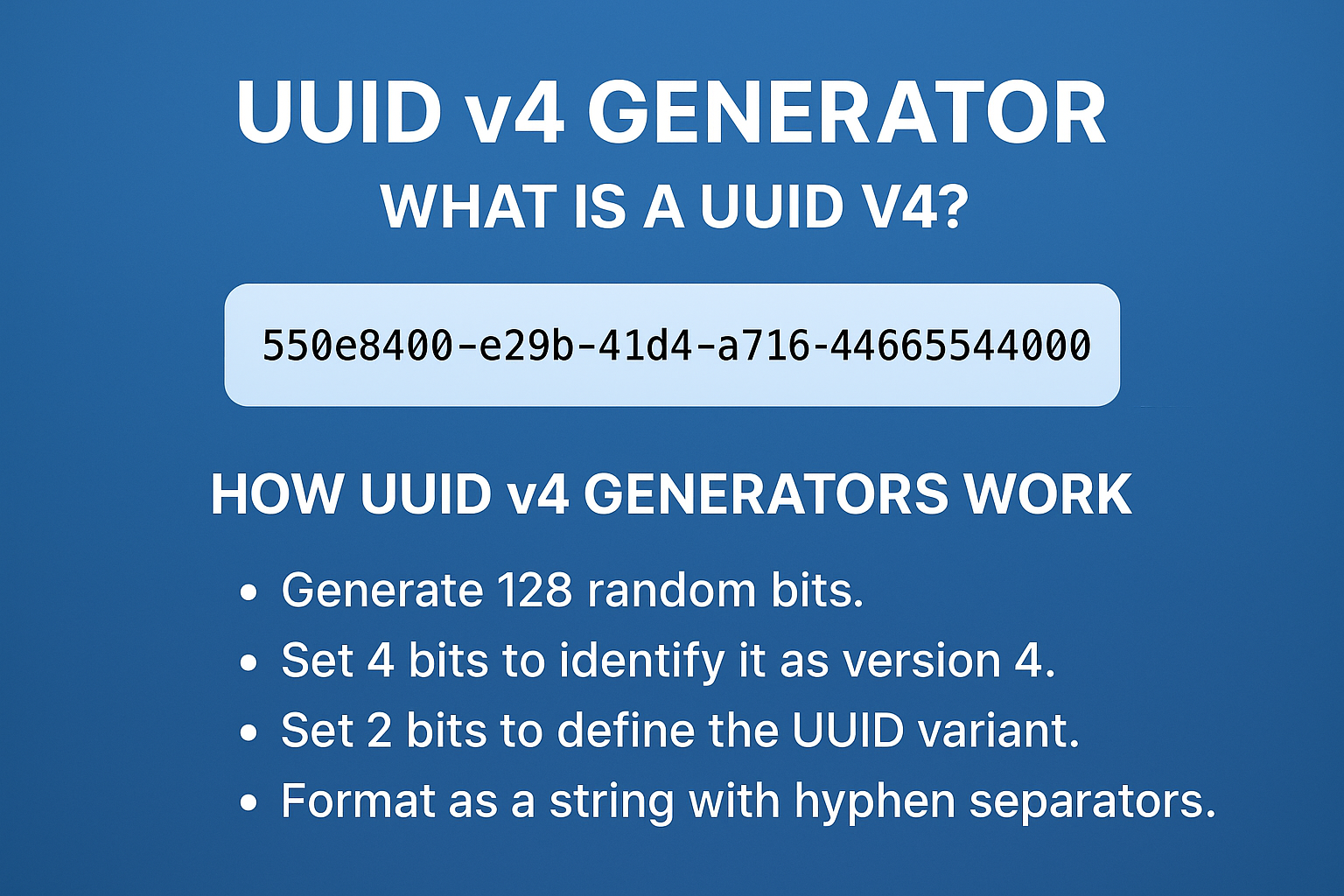
UUID v4 generator
Created on 3 October, 2025 • Generator tools • 77 views • 2 minutes read
"Learn everything about UUID v4 generators – what they are, how they work, and why they are essential for unique identifiers in databases, APIs, and distributed systems. Generate secure, random UUIDs with ease."
UUID v4 Generator: A Complete GuideWhat is a UUID?
A UUID (Universally Unique Identifier) is a 128-bit value used to uniquely identify information across systems, networks, and databases. UUIDs are especially useful in distributed systems where multiple machines need to generate unique IDs without depending on a central authority. Instead of relying on incremental IDs that may cause duplication, UUIDs ensure uniqueness with extremely high probability.
UUIDs are widely used in databases, APIs, software development, cloud computing, and even IoT devices. They play a crucial role in ensuring consistency, avoiding collisions, and improving scalability.
Understanding UUID v4
There are multiple versions of UUIDs, each generated differently. UUID v4 is one of the most popular versions, known for its simplicity and randomness.
UUID v1 is based on timestamp and MAC address.
UUID v3 and v5 use hashing (MD5 or SHA-1).
UUID v4 relies purely on randomness.
A UUID v4 generator produces identifiers using random or pseudo-random numbers. Since it is not tied to hardware or time, v4 UUIDs are safer from privacy concerns and easier to implement.
UUID v4 Format Example
A UUID v4 looks like this:
550e8400-e29b-41d4-a716-446655440000
It consists of 32 hexadecimal characters separated by hyphens into five groups (8-4-4-4-12).
Why Use a UUID v4 Generator?
There are several reasons why developers and businesses choose a UUID v4 generator:
1. Uniqueness Across Systems
UUID v4 provides extremely low chances of collision, even when millions are generated. This makes them ideal for distributed systems and microservices.
2. Scalability
Applications can generate UUIDs independently without relying on a central server, improving performance and fault tolerance.
3. Security & Privacy
Unlike UUID v1, which includes MAC addresses and timestamps, UUID v4 is random and does not expose sensitive system information.
4. Database Efficiency
UUIDs are widely used as database keys, especially in NoSQL databases like MongoDB or Cassandra, where decentralization is essential.
How UUID v4 Generators Work
A UUID v4 generator uses random number algorithms to produce a 128-bit number. Typically, 122 of the 128 bits are random, while a few bits are reserved to indicate version and variant.
Steps:
Generate 128 random bits.
Set 4 bits to identify it as version 4.
Set 2 bits to define the UUID variant.
Format as a string with hyphen separators.
Many programming languages provide built-in support for UUID v4 generation:
Python: import uuid; uuid.uuid4()
JavaScript: crypto.randomUUID() or uuid library
Java: UUID.randomUUID()
Go: github.com/google/uuid
Benefits of Using UUID v4 Generators Online
Online UUID v4 generators are convenient for quick testing, prototyping, or manual use. They allow users to instantly generate multiple UUIDs without installing libraries.
Some benefits include:
Generate multiple UUIDs at once.
Copy-paste ready format.
Works on any device with a browser.
Conclusion
A UUID v4 generator is an essential tool for developers, databases, and distributed systems. Its randomness, uniqueness, and privacy-friendly nature make it one of the most reliable ways to generate identifiers. Whether you are building an API, assigning IDs in databases, or developing scalable applications, UUID v4 ensures you never worry about collisions.
Popular posts
-
Barcode readerMisc Tools • 160 views
-
Color pickerMisc Tools • 122 views
-
Exif readerMisc Tools • 117 views
-
SHA-256 generatorGenerator tools • 93 views
-
Ip LookupChecker Tools • 90 views